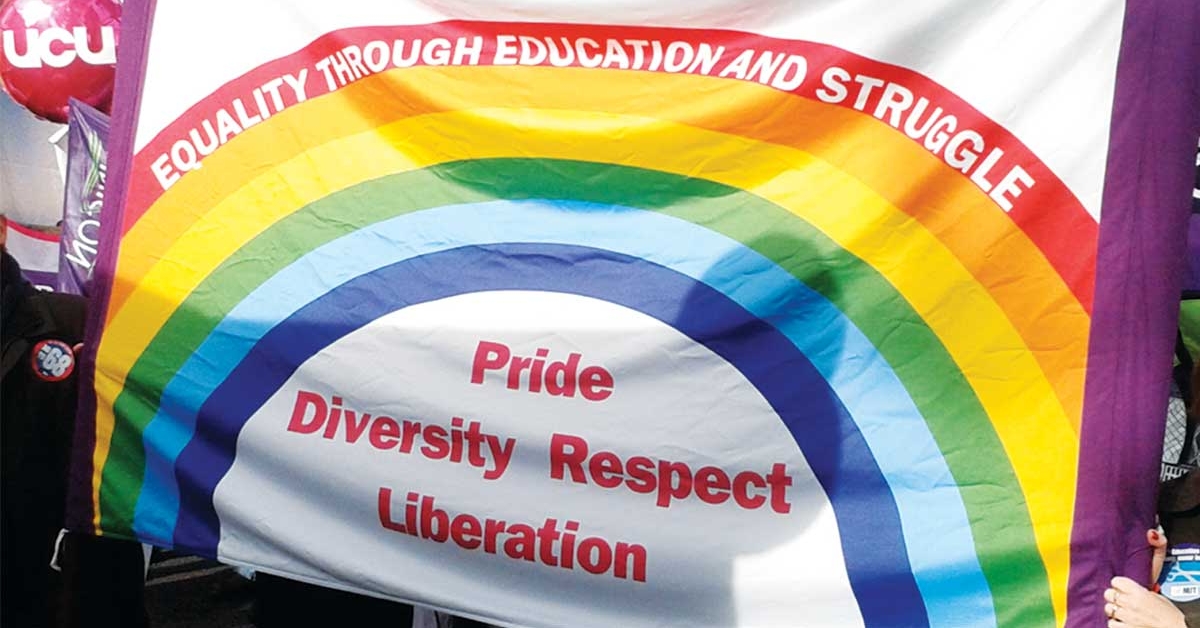
Proud/Loud/Heard... ? Exploring LGBT+ identity, being and experiences
30 November 2022
Collection of papers drawn from presentations made at UCU's 7th LGBT+ research conference held in May 2023.
Proud/Loud/Heard... ? Exploring LGBT+ identity, being and experiences
We are delighted to have brought together this collection of papers. The collection is drawn from presentations made at the 7th LGBT+ research conference which was held online on 19 May 2023.
The LGBT+ research conference is currently organised biennially to help foreground research about LGBT+ lives and issues. There has been concern about a lack of importance afforded to LGBT+ research in universities and programmes such as the research excellence framework (REF). These concerns have been addressed in several motions to UCU Congress that have subsequently become UCU policy.
Activist and academic researchers are invited to submit papers to the LGBT+ research conference which are then peer reviewed prior to invitations being sent for presentations. It is the conference itself, rather than individual papers, that is grounded in UCU policy, so there may be papers presented that do not directly relate to UCU policy. Similarly, as this collection arises from presentations to that conference it does not represent UCU policy but rather gives a picture of conference proceedings.
With thanks to the review and editorial team of this collection.
Andrew Clements
Seth Atkin
Jennie Appleyard
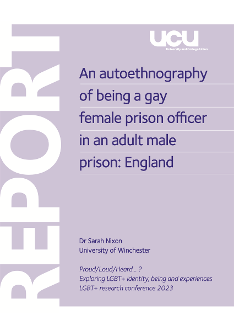 An autoethnography of being a gay female prison officer in an adult male prison: England
An autoethnography of being a gay female prison officer in an adult male prison: England
Dr Sarah Nixon
University of Winchester
![]() An autoethnography of being a gay female prison officer in an adult male prison, Nixon [223kb]
An autoethnography of being a gay female prison officer in an adult male prison, Nixon [223kb]
In this paper I present lived experiences of being a gay female prison officer working in an adult male prison in England. I served between 2003 and 2009 and whilst in post I kept a reflective journal of interactions between myself, staff, and prisoners. Transitioning into academia I have used data from the journal to present insights into the complexities of being a prison officer and how we survive the social world of a prison with a marginalised identity. Autoethnography (AE) is a methodological approach and suitable lens in which to present lived experiences, to uncover the hidden depths of insider positionality around LGBTQ+ as a prison officer. Sexual identity is irrelevant to the fundamental requirements of being a prison officer, yet it was a major source of conflict and confrontation whilst I was learning how to be a prison officer. Themes covered range on a continuum from subtle microaggressions and workplace incivility, to blatant homophobia. There are still challenges to supporting LGBTQ+ staff in terms of inclusivity, equality, and diversity. I therefore aim in this paper to bring light to some of the dynamics around sexual identity and how it plays out in the role of prison officer.
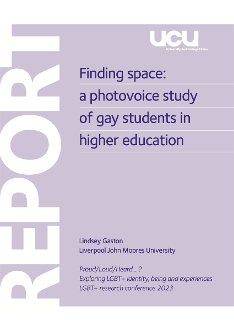 Finding Space: A Photovoice Study of Gay Students in Higher Education
Finding Space: A Photovoice Study of Gay Students in Higher Education
Lindsey Gaston
Liverpool John Moore University
![]() Finding Space: A Photovoice Study of Gay Students in Higher Education, Gaston [200kb]
Finding Space: A Photovoice Study of Gay Students in Higher Education, Gaston [200kb]
This paper contributes to both the current knowledge and mythological gap which documents the lived experiences of gay students in Higher Education. With the help of Photovoice, this paper adds to the needed qualitative understanding of the lived experiences of gay students studying at university in the United Kingdom.
The data will show that the participants experienced a sense of loneliness and isolation whilst at university and identified the classroom as a critically important environment to create a sense of belonging and mattering. Whilst the classroom is central to developing both, the data complicates this fact by identifying that gay student's battle with how to perform as themselves in the classroom thusly affecting their engagement and attendance. Additionally, the data will show that while participants did not experience overt hostility nor brazen acts of homophobia, they did recognize a degree of LGBTQAI+ inclusion 'lip service'.
Through Photovoice, this research provides greater level of qualitative data highlighting that gay students experience a different university journey and how the classroom space can create an inclusive educational spaces for gay students.
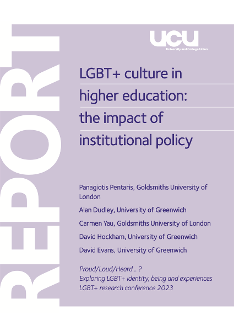 LGBT+ Culture in Higher Education: The impact of institutional policy
LGBT+ Culture in Higher Education: The impact of institutional policy
Panagiotis Pentaris, Goldsmiths University of London
Alan Dudley, University of Greenwich
Carmen Yau, Goldsmiths University of London
David Hockham, University of Greenwich
David Evans, University of Greenwich
![]() LGBT+ Culture in Higher Education, Pentaris et al [212kb]
LGBT+ Culture in Higher Education, Pentaris et al [212kb]
This paper explores findings from a case study considering the lived experience of LGBT+ staff and allies within the context of a higher education institution. Institutions are required to act where instances of [indirect, structural, or systemic] disadvantage or discrimination are identified. This is mandated by the Public Sector Duty directives outlined within section 149 of the UK Equality Act 2010, 'those subject to the equality duty must, in the exercise of their functions, have due regard to the need to eliminate unlawful discrimination' and to remove or minimise disadvantage (E&HRC, 2023). Here we consider findings emanating specifically from the qualitative document analysis (QDA) phase, which examined the impact of institutional policies on the lived experiences of LGBT+ staff.
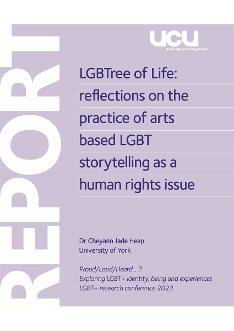 LGBTree of Life: Reflections on the practice of arts based LGBT storytelling as a human rights issue
LGBTree of Life: Reflections on the practice of arts based LGBT storytelling as a human rights issue
Dr Cheyann Jade Heap
University of York
This paper presents a reflection on LGBT human rights, creative methods of storytelling, and the role of empirical evidence, in the context of the covid-19 pandemic and its recovery. Firstly, the paper outlines LGBT rights as human rights, and places this in the context of the pandemic and a local case study in York, England. It then describes a novel arts-based workshop, the LGBTree of Life, which was designed as part of a human-rights based project to facilitate storytelling and meaning-making around LGBT people's experiences of the pandemic. The LGBTree of Life was enacted with six participants both online and offline. Findings from the study were used to create an online display and recommendations for a strong COVID-19 recovery in York and the surrounding area. The practicalities of running the workshop are discussed, alongside key ethical dilemmas which arose as part of the project. Finally, the paper uses this case study to reflect upon the key LGBT human rights debates and consider the relevance of using new and creative methods to support people's human rights.
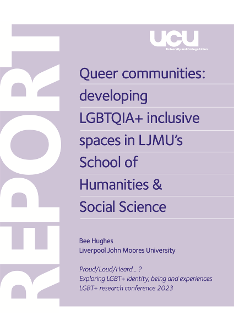 Queer Communities: Developing LGBTQIA+ Inclusive Spaces in LJMU's School of Humanities & Social Science
Queer Communities: Developing LGBTQIA+ Inclusive Spaces in LJMU's School of Humanities & Social Science
Bee Hughes
Liverpool John Moores University
This paper presents a small-scale intervention in the social and educational environment of the School of Humanities and Social Science (HSS) at Liverpool John Moores University (LJMU). The project - supported through funded LJMU Curriculum Enhancement Internships - aims to create space to discuss queer life, space and joy within the school's academic environment, critically consider challenges for queer students in Higher Education, and co-create materials to improve LGBTQIA+ inclusion and visibility. The Queer Communities project aimed to build on the wider work undertaken at LJMU, through EDI initiatives such as Understanding Pronouns videos (LJMU, 2022) and John Moores Students Union projects and societies by developing student-led and school specific spaces for developing LGBTQIA+ community and enhancing visibility.
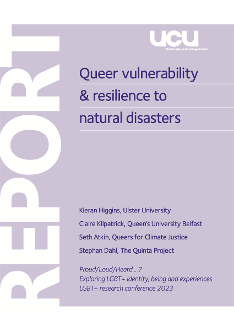 Queer Vulnerability & Resilience to Natural Disasters
Queer Vulnerability & Resilience to Natural Disasters
Kieran Higgins, Learning Enhancement Directorate, Ulster University
Claire Kilpatrick, Queen's Management School, Queen's University Belfast
Seth Atkin, Queers for Climate Justice
Stephan Dahl, The Quinta Project
![]() Queer Vulnerability & Resilience to Natural Disasters, Higgins et al [162kb]
Queer Vulnerability & Resilience to Natural Disasters, Higgins et al [162kb]
So-called 'natural disasters' have devastating impacts on society, and the increase in the frequency and intensity of these disasters due to climate change means the impact of these are an increasingly salient concern to all. However, previous research has shown the disproportionate impacts of said disasters on marginalised populations, including the queer community, who are vulnerable to these impacts before, during and after. Through the framework of social constructionism, this paper explores how we as a society create inequity for queer people, respond to disasters without inclusion and recover from them with exclusion, which is what makes them a disaster, and an unnatural one at that. The paper also looks to the queer community and their acts of resilience as a lever to recast them from the role of victim, whilst acknowledging the limitations and sometimes harmful impact of expecting individuals and groups to be resilient in the face of such disasters.
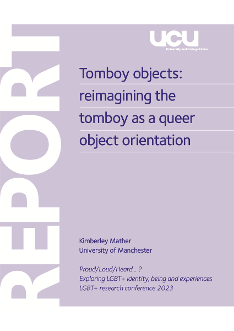 Tomboy Objects: Reimagining the Tomboy as a Queer Object Orientation
Tomboy Objects: Reimagining the Tomboy as a Queer Object Orientation
Kimberley Mather
University of Manchester
![]() Tomboy Objects: Reimagining the Tomboy as a Queer Object Orientation, Mather [258kb]
Tomboy Objects: Reimagining the Tomboy as a Queer Object Orientation, Mather [258kb]
L is for Lion by Annie Lanzillotto (2013) and Tomboy Survival Guide by Ivan Coyote (2016) both narrate a childhood in which the self is constructed through a 'tomboy' identification. In this paper I read these two texts through a queer phenomenological framework, putting them into conversation with each other and with Maurice Merleau-Ponty's (1962) notion of intentionality and Sara Ahmed's (2006; 2010; 2012) queer phenomenology to reimagine the tomboy as a queer orientation towards objects. Furthermore, through this object orientation, the autobiographical narratives allow the tomboy to refuse heterosexual feminine ideals and to co-exist as both the potential queer and the actual future queer. The objects in L is for Lion become queer through proximity to the body, bringing with them a promise of transformation. In Tomboy Survival Guide, the queer disruptions brought on by the subject's failure to orient towards normative objects reveal the straightening devices that attempt to reorient the subject back into line.
- PrintPrint this page
- Share


